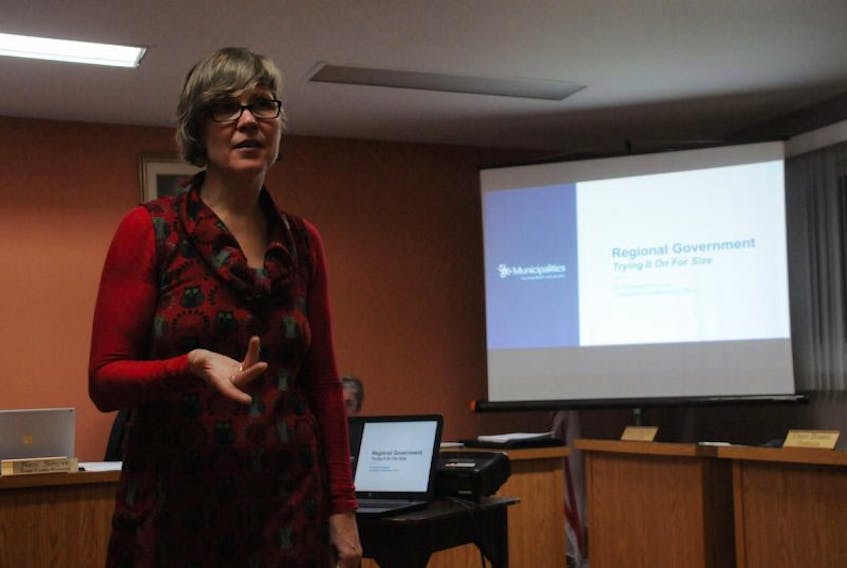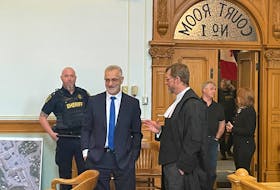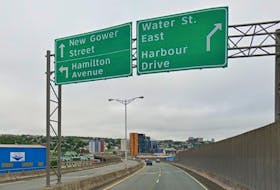“Of course, there’s been the search for fiscal renewal, for opportunities for municipalities to have broader opportunities to raise revenue,” Kathleen Parewick told a large audience of municipal leaders at the Conception Bay North Joint Council meeting last Thursday in Upper Island Cove.
“We’re seeking legislative reforms to the Municipalities Act to address a number of other concerns. We’ve had a number of wins in recent years, but the regional government one has been the one that’s been on the docket for quite some time and where we see major opportunity. We’re one of the only jurisdictions in North America that lacks some degree of an intermediate governance layer between the local governments and the province or state. It is a critical need.”
“Of course, there’s been the search for fiscal renewal, for opportunities for municipalities to have broader opportunities to raise revenue,” Kathleen Parewick told a large audience of municipal leaders at the Conception Bay North Joint Council meeting last Thursday in Upper Island Cove.
“We’re seeking legislative reforms to the Municipalities Act to address a number of other concerns. We’ve had a number of wins in recent years, but the regional government one has been the one that’s been on the docket for quite some time and where we see major opportunity. We’re one of the only jurisdictions in North America that lacks some degree of an intermediate governance layer between the local governments and the province or state. It is a critical need.”
Parewick was invited to the meeting to offer some insight on the topic, which has been discussed at length in recent meetings as the joint council debates whether to have towns engage in a plebiscite vote.
That vote would ask residents whether they want their respective town leaders to enter talks to explore regional government options.
Parewick, who specifically looks after the regional government file for MNL, views it as a means to enhance resources and more efficiently serve residents.
“Of course, we’ve had regional entities in the past that have facilitated things for us. You’ve got your rural development associations, you’ve had the zone boards, you’ve had other authorities that function in a regional fashion and allow there to be some rallying of resources to serve a small and distributed population and provide an opportunity to garner greater services … or a greater level of services for the communities.”
As part of her presentation in Upper Island Cove, Parewick attempted to differentiate between a regional government and an amalgamated municipality.
Acknowledging the ever-present confusion at play when it comes to understanding these two models, she presented the regional approach as a distinct form of government where municipalities are grouped together under a regional, political and administrative structure.
It would serve as an extra layer of government bringing these municipalities together.
“We’re basically talking about a regional government body like this where the municipalities that exist right now in the region would have their representatives,” Parewick said. “There would be representation for the populations that are currently not organized as municipalities — our local service districts and unincorporated areas. We’re seeking to maintain a representative entity for an entire region if we’re going to proceed with that path.”

An amalgamated municipality would eliminate entirely previous councils to form a new government, as was the case when the nine towns in Conception Bay South joined forces to create a new municipality.
Former C.B.S. mayor Ken McDonald, who now represents the federal riding of Avalon, was at last Thursday’s meeting. He still lives in C.B.S.
“It has worked,” he said. “Instead of nine communities looking to get something from government, it was one community, a bigger entity.”
He outright denied an amalgamated municipality would result in towns losing their identity, though he did note the experience is unique for new residents moving in.
“It doesn’t happen. People ask me where I’m from. I’m from Kelligrews, Conception Bay South. Now newer people moving into the community don’t have that connection with Kelligrews, Foxtrap, Topsail and Seal Cove or wherever, but I still have it and I’ll probably never lose that connection.”
McDonald later added amalgamation should never be forced on a town.
SEE RELATED:
‘Amalgamation on the tip of towns’ tongues’
Joint council municipalities will now decide whether they want to engage in further discussions within a committee on regional government’s potential in Conception Bay North.
These discussions would lead to a plebiscite vote for residents on the issue, though towns that agree to take part in the committee do not have to commit to a plebiscite at this stage.
The committee will likely be formed at the Feb. 23 joint council meeting in Harbour Grace.









